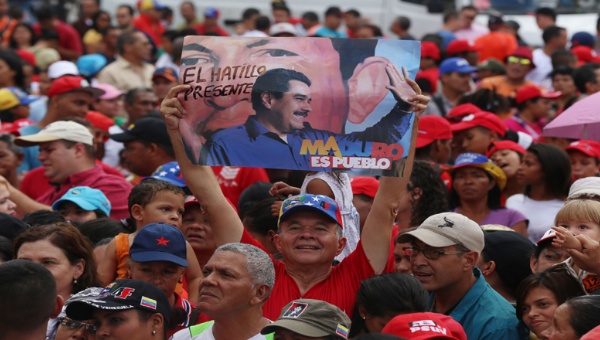
One of the more popular comparisons of critics of Vermont senator Bernie Sanders is between the brand of ‘democratic socialism’ that Sanders has espoused in his Democratic presidential campaign and Venezuelan-style socialism.![]()
![]()
But for reasons I’ll describe below, it’s a facile and wrong-headed comparison, and it’s an insult both to Sanders and to the Venezuelan opposition that’s struggling so hard against something much more insidious than just ‘democratic socialism.’
* * * * *
RELATED: Eight things Americans should know about the Danish (and Nordic) welfare state
* * * * *
Sanders has looked to countries like Sweden and Denmark, arguing that the US social welfare net should look more like the Nordic social welfare net. Those are countries that, by and large, conduct free and fair elections with a firm dividing line between government and party, squeaky-clean transparency, a tradition both of consensus-building and more recently, a reformist nudge that’s tried to retool creaking social welfare system toward more competition and liberalism.
No one disputes Venezuela’s problems, which faces today probably the globe’s most painful economic crisis. They are immense.
But it didn’t get there through Scandinavian-style socialism. Or social democracy. Or democratic socialism.
Venezuela got to this point because a democratic authoritarian won an election in 1998 against two corrupt and clientelist political parties that had failed to deliver the wealth of Venezuela’s oil riches to its poorest citizens, all while handing out middle-class goodies like ridiculous subsidies for gasoline. For decades before the rise of Hugo Chávez, Venezuela was succumbing to the ‘resource curse’ that left it dependent on foreign imports and susceptible to overspending and overborrowing.
Chávez perpetuated that clientelist state and put it on steroids by flattening long-standing patronage networks into a personality cult with Chávez (and, of course, Simón Bolívar) at its heart. He did so with a nominally socialist platform that, for a while, delivered more gains to Venezuela’s impoverished.
He did so at the expense of accountability and efficiency in government policymaking, and he presided over a corrupt regime that enriched a small ‘boligarchy’ lucky enough to have gotten their share of Venezuela’s now-dwindling resource pie.
So Venezuela is crumbling today, yes, because of chavismo.
But chavismo is not simply socialism. It’s an entire bucket of squalid failures, including outdated statist policies (like currency controls, nothing that Sanders has ever advocated for the United States), but also rank corruption, abject incompetence, media intimidation and soft authoritarianism, all wrapped up in the personality cult of a former military man who first tried to take power in a coup.
Chavismo always had more in common with the populist ‘big man’ caudillo politics of 19th and 20th century Latin America than with the democratic socialism of northern Europe.
As was clear when I went to Caracas in April 2013 for the last presidential election, Venezuela was already headed into a slow death glide, even when oil was selling for around $100 a barrel. At one-third of that price, it’s no wonder that economic pandemonium is accelerating. Sadly, the opposition’s newly-won control of the Venezuelan national assembly last December has only resulted in gridlock and obstruction from chavista president Nicolás Maduro (though there’s a path to remove Maduro later this year by recall vote).
Don’t get me wrong. There are many valid arguments against Sanders, and sometimes I wonder if he himself realizes markets actually exist or if he understands the fundamentals of Ricardan free trade theory.
But think twice when you hear critics who want to connect the dots from Sanders to chavismo. It’s completely wrong, it misunderstands the political traditions of the United States, Europe and Latin America. Above all, it’s an insult to Venezuelans like Henrique Capriles, the nominal leader of the opposition coalition, and Leopoldo López, who has been imprisoned on political charges for two years, both of whom have been fighting years for a saner economic policy in Venezuela.